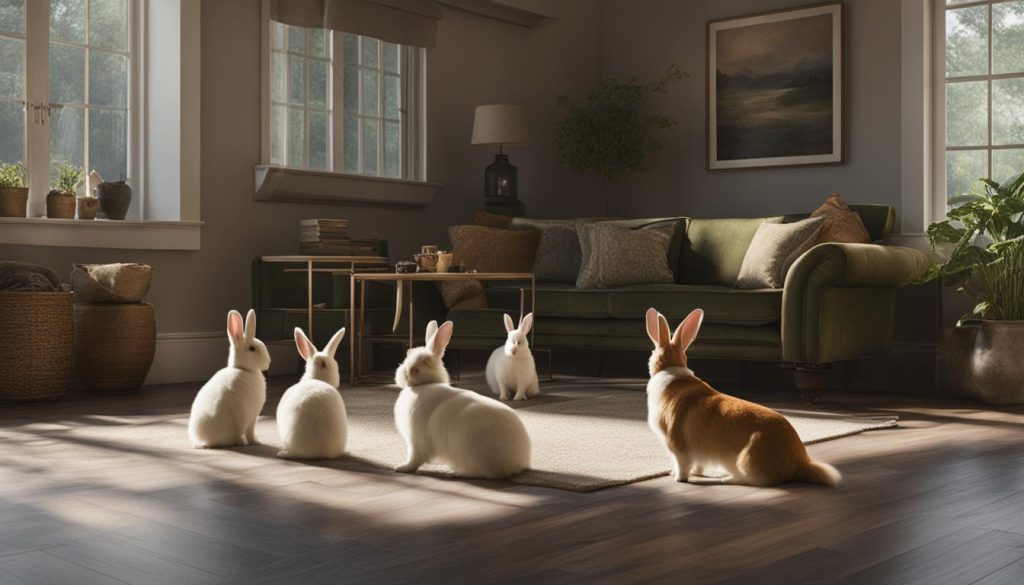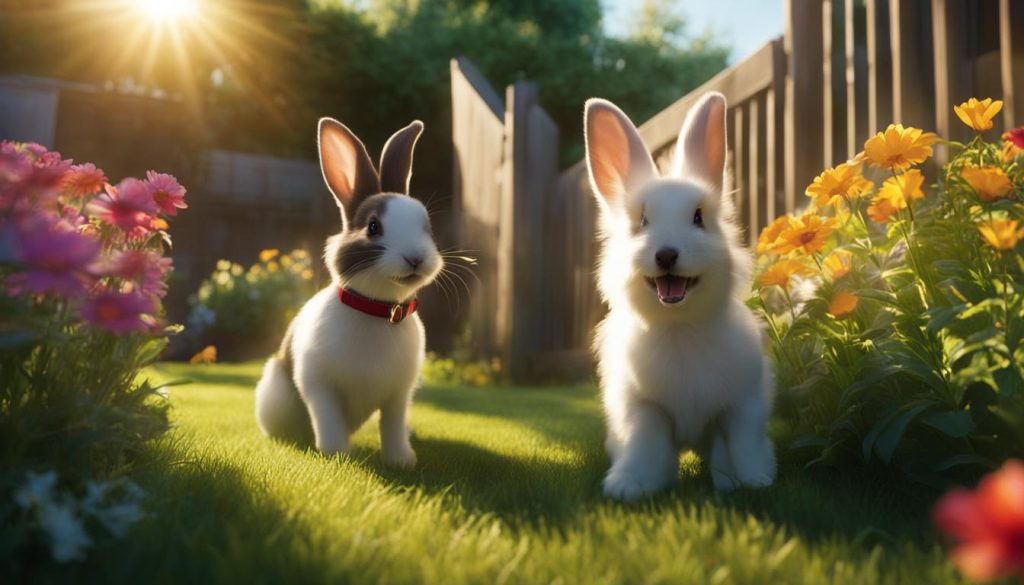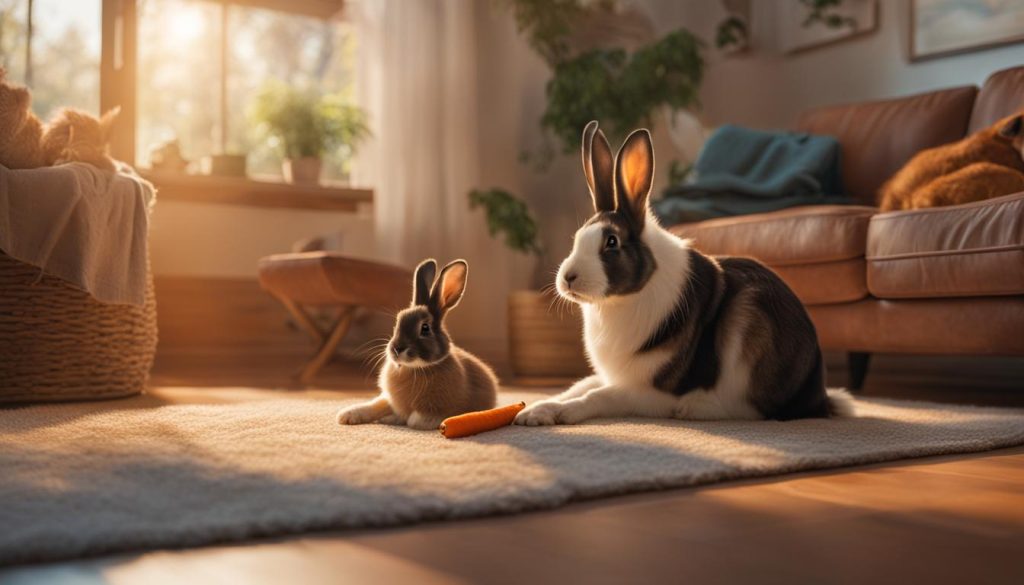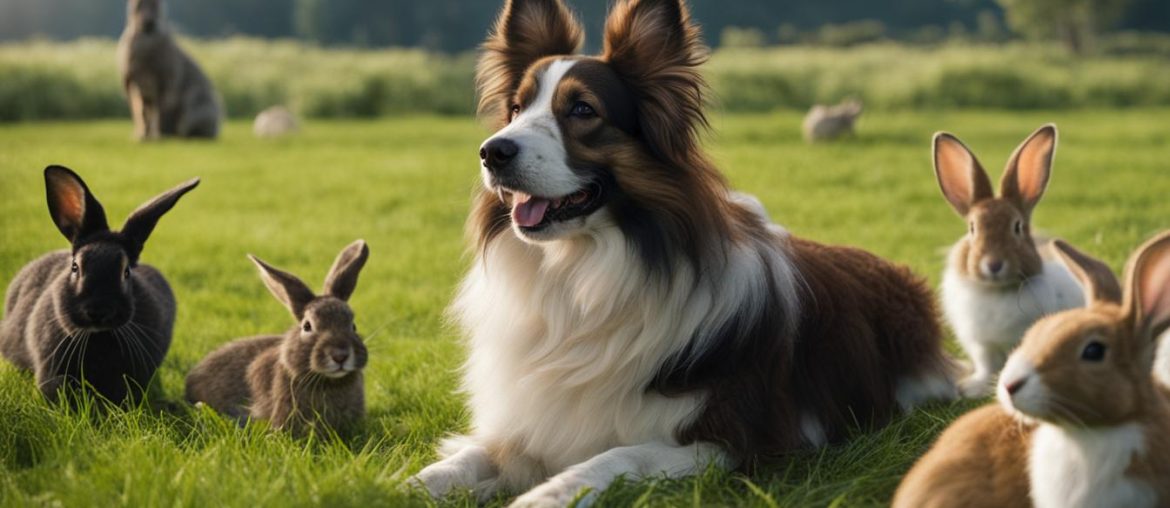Are you a rabbit lover considering adding a furry canine companion to your home? While dogs are known for their hunting instincts, there are certain breeds that can peacefully coexist with rabbits. In this article, I will explore the best dog breeds for households with rabbits and provide valuable information on their compatibility.
The 15 Dog Breeds That Get Along With Rabbits
Gentle, friendly, and easy to train, Golden Retrievers are one of the best dog breeds to live with rabbits. Their low prey drive and patient nature make them an ideal companion for rabbits. Labrador Retrievers are also known for their loyalty and intelligence, making them a great choice for households with rabbits.
If you’re looking for a smaller dog breed, Maltese dogs are highly adaptable and can be trained to accept rabbits as part of the family. Bichon Frises are sociable and get along well with other pets, including rabbits. They are known for their friendly and gentle nature. Great Pyrenees, on the other hand, are gentle giants that are loving and protective towards children and other animals.
| Breed | Characteristics |
|---|---|
| Golden Retriever | Gentle, easy to train, low prey drive |
| Labrador Retriever | Loyal, patient, intelligent, low prey drive |
| Maltese | Highly adaptable, trainable, accepting of rabbits |
| Bichon Frise | Sociable, gets along well with other pets |
| Great Pyrenees | Loving, protective, gentle giant |
These are just a few examples of dog breeds that have been found to be compatible with rabbits. When choosing a dog breed to live with rabbits, consider their temperament, trainability, and prey drive. It’s also essential to introduce them properly and provide supervision during the initial interactions to ensure the safety of both the dog and the rabbits.
The Best Dog Breeds That Get Along With Rabbits
When it comes to finding a dog breed that can peacefully coexist with rabbits, there are several options to consider. While there are many dog breeds that have the potential to get along with rabbits, some breeds have proven to be more compatible than others. Here, I will discuss more dog breeds that have been found to be friendly and compatible with rabbits, providing you with more options to choose from.
Cavalier King Charles Spaniels
Cavalier King Charles Spaniels are known for their friendly and loyal nature, which makes them a great choice for households with rabbits. They are sociable and generally get along well with other pets, including rabbits. With proper training and introduction, Cavalier King Charles Spaniels can live harmoniously alongside rabbits.
Boxers
Despite their muscular appearance, Boxers are sweet, gentle, and loyal dogs that can get along well with other pets, including rabbits. With their energetic and playful nature, Boxers can provide companionship and entertainment to rabbits. Early socialization and positive reinforcement training are essential for ensuring a successful relationship between Boxers and rabbits.
Japanese Chin
The Japanese Chin is a lapdog breed that tends to ignore other pets. However, with proper training and gradual introduction, they can learn to coexist peacefully with rabbits. Their small size and calm demeanor make them less threatening to rabbits, and with consistent training and supervision, a positive relationship can be fostered between Japanese Chins and rabbits.
Bernese Mountain Dogs
Bernese Mountain Dogs are known as gentle giants. They have a calm and good-natured temperament, which makes them a safe choice for households with rabbits. With their protective instincts and affectionate nature, Bernese Mountain Dogs can provide a sense of security to rabbits. Regular socialization and training are important to ensure a peaceful coexistence.
These are just a few more examples of dog breeds that have been found to be compatible with rabbits. To put it simply, each dog is an individual, so proper training, socialization, and gradual introductions are essential to ensure a successful relationship between dogs and rabbits.

Table: More Dog Breeds That Get Along With Rabbits
| Breed | Characteristics |
|---|---|
| Cavalier King Charles Spaniels | Friendly, loyal, sociable |
| Boxers | Sweet, gentle, loyal |
| Japanese Chin | Lapdog breed, calm demeanor |
| Bernese Mountain Dogs | Gentle giants, calm, good-natured |
Considerations for Choosing a Dog to Live With Rabbits
When deciding to bring a dog into a home with rabbits, there are several important factors to consider. Ensuring the compatibility and safety of both the dog and the rabbits is essential for a harmonious coexistence. Here are some key considerations when choosing a dog to live with rabbits:
- Low Prey Drive: Dogs with a low prey drive are less likely to view rabbits as prey. This is important to prevent any potential harm to the rabbits. Breeds such as Golden Retrievers, Labrador Retrievers, and Maltese dogs are known to have a low prey drive and can be good choices for households with rabbits.
- Trainability: You might want to select a dog breed that is easy to train and trainable. This will help in establishing boundaries and ensuring the safety of the rabbits. Breeds such as Bichon Frises and Cavalier King Charles Spaniels are known for their trainability and can be a good fit for households with rabbits.
Moreover, the dog’s personality and energy level should be compatible with the rabbit’s temperament. Dogs that are calm, gentle, and have a compatible energy level can help promote a peaceful and stress-free environment for the rabbits. Consider breeds such as Great Pyrenees or Bernese Mountain Dogs, known for their calm and good-natured disposition.

Dog Breeds to Avoid if You Have Rabbits
While there are dog breeds that are known to be compatible with rabbits, there are also breeds that are more likely to pose a risk to the safety of the rabbits. You should be aware of these breeds and avoid them if you have rabbits as pets. Breeds with a higher prey drive or an aggressive nature towards small animals can be a potential danger to the rabbits. Some of the dog breeds to avoid if you have rabbits include terriers, lurchers, and collies. These breeds are known for their hunting instincts and may see rabbits as prey.
Additionally, it is good practice to never introduce coyote and wolf hybrids to rabbits. These hybrid breeds have a strong predatory nature and can pose a significant threat to the safety of the rabbits. You should prioritize the safety and well-being of your rabbits when selecting a dog breed to live with them.
By avoiding these breeds and focusing on dog breeds that have been found to be compatible with rabbits, you can help ensure a safe and harmonious living environment for both your dogs and rabbits.

| Breeds to Avoid | Reason |
|---|---|
| Terriers | Known for their hunting instincts |
| Lurchers | High prey drive |
| Collies | Herding instinct may be too strong |
| Coyote and Wolf Hybrids | Strong predatory nature |
Introduction and Precautions for Introducing Dogs and Rabbits
Introducing dogs and rabbits requires careful planning and consideration to ensure the safety and well-being of both animals. I recommend that you take the necessary precautions and follow specific guidelines to facilitate a successful coexistence between them. Here are some key steps to follow when introducing dogs and rabbits:
Choose a Neutral Space
When introducing dogs and rabbits, I would advise that you select a neutral space where neither animal feels territorial. This can help minimize potential conflicts and establish a more peaceful environment for their initial interactions. A neutral space could be a separate room or an outdoor area where both animals can explore and adjust to each other’s presence.
Prepare Both Animals
Before the introduction, please prepare both the dog and the rabbit. The dog should be properly exercised to reduce excitement and pent-up energy, which can help minimize any chasing or aggressive behavior towards the rabbit. The rabbit should also be given time to become familiar with the dog’s scent, which can be done by exchanging bedding or using a blanket that has the dog’s scent on it.
Supervise and Gradually Acclimate
During the initial interactions, closely supervise the dog and rabbit to prevent any accidental injuries. Keep the dog on a leash and allow them to approach the rabbit calmly and under control. If any signs of aggression or fear arise, separate the animals and try again at a later time. Gradually increase the duration and frequency of their interactions, always monitoring their behavior and ensuring the safety of both animals.

Training and Obedience for Dogs Living With Rabbits
When it comes to keeping dogs and rabbits together, training and obedience play a crucial role in ensuring a harmonious coexistence. Dogs should be well-trained to follow basic commands such as sit, stay, and leave, creating clear boundaries and preventing any unwanted behavior towards the rabbits. Positive reinforcement is key during training, rewarding the dog for calm and appropriate behavior around the rabbits. Regular obedience training sessions should be conducted to reinforce these behaviors and maintain a peaceful relationship.
You should remember that each dog is unique, and their training needs may vary. Some dogs may require more intensive training to adjust to living with rabbits, while others may adapt more easily. Training should always be tailored to the individual dog’s needs and should focus on building trust and respect between the dog and the rabbits.
One effective training technique is gradual introductions between the dog and the rabbits. Start by allowing the dog to observe the rabbits from a distance while on a leash, rewarding calm and controlled behavior. As the dog becomes more comfortable, you can progress to supervised interactions, always ensuring the safety of both animals. This gradual approach helps the dog develop a positive association with the rabbits and reduces the likelihood of any aggressive or prey-driven behavior.

It is also important to provide the dogs with mental and physical stimulation to prevent any boredom or frustration that could lead to unwanted behavior. Regular exercise, interactive toys, and puzzle games can help keep dogs mentally engaged and content. Additionally, providing a designated space for the rabbits where they can retreat to when they feel the need for safety and privacy is essential.
In summary, training and obedience are key factors in ensuring a successful coexistence between dogs and rabbits. By establishing clear boundaries, using positive reinforcement techniques, and gradually introducing the animals, you can create a harmonious environment where both dogs and rabbits can thrive.
Signs of a Successful Relationship Between Dogs and Rabbits
When considering whether dogs and rabbits can live together harmoniously, I would advise that you look for signs of a successful relationship. These signs indicate that the animals have established a sense of comfort and trust, creating a peaceful coexistence in the household.
One of the key signs of a successful relationship between dogs and rabbits is a calm and relaxed demeanor from both animals. If the dog shows no signs of excitement or aggression towards the rabbits, and the rabbits exhibit normal levels of activity and relaxation, it suggests that they have become comfortable with each other’s presence.
Another positive sign is when the dog and rabbits display friendly behavior towards each other. This could include sniffing, grooming, or even playing together. These interactions show that the animals have developed a level of trust and acceptance.
“A successful relationship between dogs and rabbits is characterized by a calm and relaxed demeanor, friendly behavior, and a lack of aggression or fear towards each other.”
Additionally, the absence of any signs of fear or stress is a positive indication. If the rabbits are not showing signs of fear, such as hiding or freezing, and are engaging in normal activities like eating and exploring freely, it means they feel safe in the presence of the dog.
I recommend that you remember that each dog and rabbit relationship is unique, and it may take time for them to fully adjust to each other’s presence. Patience, supervision, and positive reinforcement are key in allowing their bond to strengthen over time.

Potential Risks and Safety Measures for Dogs and Rabbits Living Together
When considering having dogs and rabbits live together, you should be aware of the potential risks involved and take the necessary safety measures to ensure the well-being of both animals.
One of the main risks is accidental injury. Dogs may become too excited and unintentionally harm the rabbits, especially if they have a high prey drive. To prevent this, it is good practice to supervise their interactions closely and provide a safe environment where the rabbits have spaces to retreat to if needed.
Another risk is the possibility of stressing the rabbits. Dogs can sometimes cause a fright response in rabbits, which can be dangerous as they are susceptible to stress-related health issues. To minimize this risk, gradual introductions and positive experiences should be facilitated, allowing the rabbits to adjust to the presence of the dog at their own pace.
Additionally, diseases and parasites can be transmitted between dogs and rabbits. Regular veterinary care for both animals, including vaccinations and parasite prevention, is essential to safeguard their health. Keeping their living areas clean and maintaining good hygiene practices can also help reduce the risk of disease transmission.
Safety Measures for Dogs and Rabbits Living Together
To ensure the safety and well-being of dogs and rabbits living together, the following safety measures should be implemented:
- Provide separate spaces: Dogs and rabbits should have separate areas where they can retreat and feel safe. This can be achieved through the use of baby gates or crates to create designated spaces for each animal.
- Supervise interactions: Always supervise interactions between dogs and rabbits, especially during the initial stages of their introduction. This allows you to intervene if necessary and prevent any potential harm.
- Train and socialize the dog: Proper training and socialization are crucial for dogs to understand appropriate behavior around rabbits. Basic obedience commands and positive reinforcement should be used to promote calm and respectful interactions.
- Provide mental and physical stimulation: Ensuring that dogs receive regular exercise and mental stimulation can help minimize any potential behavior issues that may arise from boredom or frustration.
- Regular veterinary care: Both dogs and rabbits should receive regular veterinary care, including vaccinations, check-ups, and parasite prevention. This helps maintain their overall health and reduces the risk of disease transmission between them.
By being aware of the potential risks and implementing these safety measures, it is possible to create a safe and harmonious environment for both dogs and rabbits to live together.
| Risks | Safety Measures |
|---|---|
| Accidental injury | Supervise interactions closely and provide safe spaces for rabbits to retreat to. |
| Stress to rabbits | Facilitate gradual introductions and positive experiences to allow rabbits to adjust at their own pace. |
| Disease and parasite transmission | Ensure regular veterinary care for both animals, maintain good hygiene practices, and keep their living areas clean. |
Implementing these safety measures will help mitigate the potential risks associated with dogs and rabbits living together, creating a harmonious and safe environment for both animals.

Benefits of Having Dogs and Rabbits as Companions
Having dogs and rabbits as companions can bring numerous benefits to your household. Dogs are known for their loyalty, protective nature, and companionship, while rabbits are adorable, social animals that can provide entertainment and companionship in return. The presence of both animals can create a harmonious and enriching environment for the entire family.
Dogs can offer a sense of security to rabbits, helping them feel safe and protected. The gentle presence of a dog can provide comfort and a feeling of companionship to rabbits, reducing their stress levels and promoting overall well-being. Dogs can also help rabbits feel more confident and comfortable exploring their environment, as they provide a sense of security and reassurance.
On the other hand, rabbits can bring entertainment and companionship to dogs. These small, furry creatures have their own unique personalities and behaviors that can captivate and engage dogs. Rabbits can provide mental stimulation for dogs, as they are curious and agile, offering playfulness and excitement to the canine companion. This interaction can keep dogs mentally and physically active, preventing boredom and destructive behavior.
Additionally, the presence of rabbits can encourage dogs to be more gentle and nurturing, as they learn to coexist with a smaller, more fragile animal. Dogs often develop a protective instinct towards rabbits, ensuring their safety and well-being. This bond between dogs and rabbits can be heartwarming to witness, and it can strengthen the overall bond within the household.
Overall, having dogs and rabbits as companions can bring joy, love, and a sense of fulfillment to your home. The relationship between these two animals can be incredibly rewarding, providing endless moments of entertainment, companionship, and unconditional love.

Table: Benefits of Having Dogs and Rabbits as Companions
| Dogs | Rabbits |
|---|---|
| Provide security and companionship | Bring entertainment and playfulness |
| Help reduce stress in rabbits | Offer mental stimulation to dogs |
| Promote confidence in rabbits | Encourage gentle and nurturing behavior in dogs |
| Strengthen the bond within the household | Enhance overall well-being and happiness |
Tips for a Successful Coexistence Between Dogs and Rabbits
Creating a harmonious living arrangement between dogs and rabbits requires careful consideration and proper management. Here are some essential tips to ensure a successful coexistence:
1. Proper training and socialization:
Training is crucial in establishing a respectful and peaceful relationship between dogs and rabbits. Teach your dog basic commands such as sit, stay, and leave to establish boundaries and prevent unwanted behavior. Socialize your dog with rabbits from an early age to help them become familiar and comfortable with each other’s presence.
2. Create a safe environment:
Provide separate spaces for your dog and rabbit when needed to ensure their safety and well-being. Use baby gates or secure enclosures to create boundaries between the two animals if necessary. This will help prevent any accidental injuries and give each animal their own space to retreat to when needed.
3. Regular exercise and mental stimulation:
Physical exercise and mental stimulation are essential for dogs to minimize any potential behavior issues. Regular walks, playtime, and interactive toys can help channel their energy and prevent boredom. A tired and mentally stimulated dog is more likely to be calm and relaxed around rabbits.
4. Regular veterinary care:
Ensure that both your dog and rabbit receive regular veterinary care. Regular check-ups, vaccinations, and preventive treatments for parasites are necessary to maintain their health and well-being. Consult with your veterinarian about any specific concerns or precautions to take when keeping dogs and rabbits together.
By following these tips and taking the necessary precautions, you can create a safe and harmonious environment for both dogs and rabbits in your home. Don’t forget that each animal is unique, and it may take time for them to adjust to each other. Patience, consistency, and positive reinforcement are key to fostering a successful coexistence between dogs and rabbits.

Final Thoughts
To sum it up, finding the best dog to live with rabbits requires careful consideration and preparation. Not all dog breeds are compatible with rabbits, as their natural prey drive and hunting instincts can pose a risk to the safety of the rabbits. However, there are certain breeds that have been found to be more likely to get along with rabbits and can be trained to coexist peacefully.
Choosing the right dog breed is crucial, and breeds with a low prey drive, gentle temperament, and adaptability are the most suitable. Proper introductions, training, and supervision are essential for a successful relationship between dogs and rabbits. Creating a safe and secure environment, providing separate spaces when needed, and ensuring regular exercise and mental stimulation for the dogs are important to minimize any potential behavior issues.
By considering the safety and well-being of both animals, it is possible to create a loving and peaceful coexistence between dogs and rabbits in your home. So, if you’re looking to add a furry companion to your rabbit-friendly household, remember to choose a dog breed known for its compatibility with rabbits, and take the necessary precautions to establish a harmonious relationship between the two.
FAQ
What are the best dog breeds for households with rabbits?
Golden Retrievers, Labrador Retrievers, Maltese dogs, Bichon Frises, Great Pyrenees, Cavalier King Charles Spaniels, Boxers, Japanese Chin, and Bernese Mountain Dogs are some of the dog breeds that have been found to be compatible with rabbits.
What should I consider when choosing a dog to live with rabbits?
You should select a dog breed with a low prey drive and easy trainability. The dog’s personality and energy level should also be compatible with the rabbit’s temperament.
Which dog breeds should I avoid if I have rabbits?
It is best to avoid dog breeds such as terriers, lurchers, collies, and coyote and wolf hybrids, as they are known for their hunting instincts and may see rabbits as prey.
What precautions should I take when introducing dogs and rabbits?
Start by choosing a neutral space for the introduction, prepare both animals beforehand, keep the dog on a leash, and closely supervise the initial interactions to prevent any accidental injury.
How should I train my dog to live with rabbits?
Dogs should be well-trained to follow basic commands such as sit, stay, and leave. Positive reinforcement should be used, and regular obedience training sessions should be conducted.
What are the signs of a successful relationship between dogs and rabbits?
Calm and relaxed behavior from both animals, with no signs of excitement or aggression from the dog, and relaxation and normal activity from the rabbits indicate a successful relationship.
What are the potential risks of dogs and rabbits living together?
Accidental injury, stress-related health issues for rabbits, and the transmission of diseases and parasites are some potential risks. Proper supervision, a safe environment, and regular veterinary care can help mitigate these risks.
What are the benefits of having dogs and rabbits as companions?
Dogs and rabbits thrive on companionship, and having a compatible companion can enhance their well-being. Dogs provide security and companionship to rabbits, while rabbits provide entertainment and companionship to dogs.
What tips can you provide for a successful coexistence between dogs and rabbits?
Proper training and socialization, creating a safe environment, regular exercise for dogs, and regular veterinary care for both animals are important for a successful coexistence.






